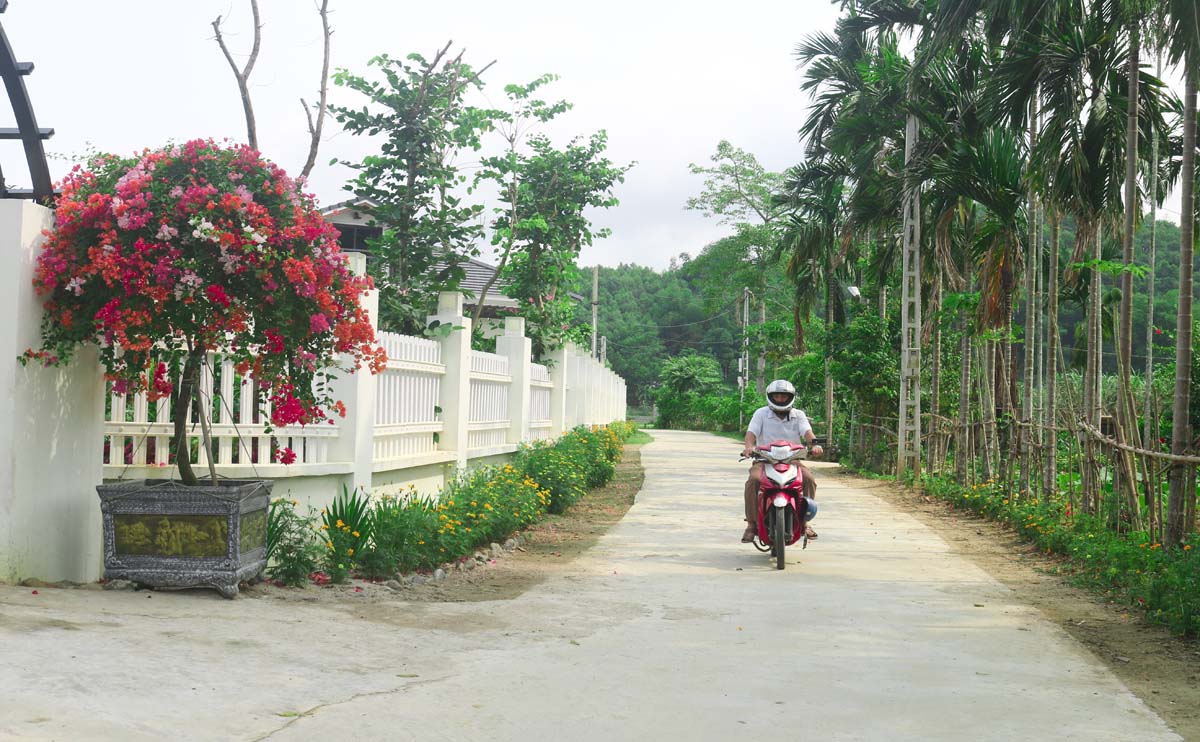


(HBO) - Coming to Cuoi village, Binh Son commune (Kim Boi), walking on a clean and beautiful concrete road, standing at Ap bridge, you can check-in with the charming landscape and watch the spacious houses sprouting up close together. Entering into the village, the flower streets of the women's union of the village are blooming and blooming as if to welcome visitors from far away. Cuoi village is wearing a new shirt with vibrant color. The difficulty and the poverty has been repelled, the prosperous life is coming to the people here.
 The living roads in Cuoi village, Binh Son commune (Kim Boi) have been
100% concreted, meeting the travel needs of the local people.
The living roads in Cuoi village, Binh Son commune (Kim Boi) have been
100% concreted, meeting the travel needs of the local people.
Mr. Bui Van Dong, the Chairman of the Communal People's Committee, says: There are 210 households with 847 people in Cuoi village. About 5 years ago, although it was only 3 km from the communal center, everyone felt afraid when mentioning Cuoi village. The households were living along the foothills of the mountain, the village were separated by a large stream, it was difficult to travel, and at that time Ap underground was not built, the local people just built a temporary small bamboo bridge to serve the travel needs and the students could walk to school. On the rainy days, it was slippery and they could not travel by motorbike, they had to walk. Melon, sugarcane, maize ...grown by the farmers could not be sold by traders, or if they bought, the price would be forced to only 2/3, or even half of the market price. Many families, due to the low price paid by traders, regret their efforts, they take their own goods to Bai Chao market (Tu Son commune), or Ranh market (Dong Bac commune) for sale. In the flood season, students often had to leave school due to the rising water, flooding bridges, and it was unable to travel.
Since Dong Bac - Binh Son inter-commune road and Ap underground were invested for the solid construction and it was put into use in 2017, the 2 km long residential road in the hamlet has also been contributed by the people to do each small section, and it was officially completed in 2020, the face of Cuoi village has changed. The hard work was still in the eyes in Cuoi village, and now it shines with excitement and joy. Having convenient transportation and the developed information technology, the people have boldly changed the structure of crops and animals towards the commodity production, earning over 100 million VND a year. Many households are getting rich by raising buffaloes, cows, and pigs, and planting forests. They include Mr. Bui Thanh Tung, Mr. Dang Minh Hung, Mr. Bach Duc Tinh, Mr. Bui Van Tam households. Up till now, more than 10 families in the village have been afford to buy cars, the that people in Cuoi village were unable to think of before.
However, there are still difficulties that directly affect the lives of the people, specifically the amount of electricity supplied is not enough to meet the people’s demand. Many families also have to use one electric meter. During peak hours, electricity is not strong enough for a rice cooker, not mentioning the use of a television, a washing machine or other appliances. The biggest desire of Cuoi villagers is to supply an additional transformer station in the hamlet so that they can have enough electricity for the domestic use.
Being endowed with a cool and fresh climate, along with preserving the unique cultural customs, Cuoi village has become an attractive place, attracting many tourists from Hanoi and Hoa Binh to choose as a resort for weekends and public holidays. In the coming time, the village will continue to preserve the traditional beauty, build a green, clean and beautiful landscape in order to proceed to building a community tourism area in Cuoi village.